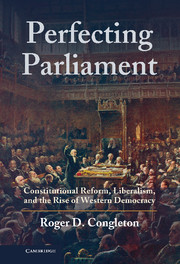Book contents
- Frontmatter
- Contents
- Preface
- 1 On the Origins of Western Democracy
- Part I Sharing Sovereignty
- Part II Historical Evidence on Western Democratic Transitions
- 9 Setting the Stage
- 10 Liberalism and Reform in the Transformative Century
- 11 Fine-Grained Constitutional Bargaining
- 12 An Overview of British Constitutional History
- 13 Constitutional Exchange in the United Kingdom
- 14 The Swedish Transition to Democracy
- 15 Constitutional Reform in the Netherlands
- 16 Germany
- 17 The Japanese Transition to Democracy and Back
- 18 The United States, an Exception or Further Illustration?
- Part III Analytical History as Social Science
- Appendix Methodological Approach, Limits, and Extensions
- References
- Index
11 - Fine-Grained Constitutional Bargaining
Published online by Cambridge University Press: 05 June 2012
- Frontmatter
- Contents
- Preface
- 1 On the Origins of Western Democracy
- Part I Sharing Sovereignty
- Part II Historical Evidence on Western Democratic Transitions
- 9 Setting the Stage
- 10 Liberalism and Reform in the Transformative Century
- 11 Fine-Grained Constitutional Bargaining
- 12 An Overview of British Constitutional History
- 13 Constitutional Exchange in the United Kingdom
- 14 The Swedish Transition to Democracy
- 15 Constitutional Reform in the Netherlands
- 16 Germany
- 17 The Japanese Transition to Democracy and Back
- 18 The United States, an Exception or Further Illustration?
- Part III Analytical History as Social Science
- Appendix Methodological Approach, Limits, and Extensions
- References
- Index
Summary
The shift from king-dominated versions of the king-and-council template to liberal constitutional democracy involved two major changes: (a) increased policy-making authority for parliament and (b) the selection of members of parliament by broad electorates. It is important to understand that both changes were multidimensional and the product of fine-grained constitutional negotiations and reforms. At some points in time, minor parts of liberal reform agendas were accepted in lieu of major reforms. In other cases, secondary details were used to reduce the effect of what would otherwise have been major liberal reforms. Suffrage might be extended for local elections before national elections or vice versa. In all cases, bargaining over the details made constitutional reforms possible that would otherwise not have been adopted.
At every step in the transition to Western democracy, a variety of procedural details had to be addressed, and many of these were revisited and renegotiated from time to time during the nineteenth century. In most cases, it was well understood that secondary reforms would affect the future course of public policy, and so debate and analysis were often extensive. The bargains struck were subtle and typically revised a number of long-standing practices at the margin with specific ideological, economic, and political effects in mind.
- Type
- Chapter
- Information
- Perfecting ParliamentConstitutional Reform, Liberalism, and the Rise of Western Democracy, pp. 266 - 294Publisher: Cambridge University PressPrint publication year: 2010



